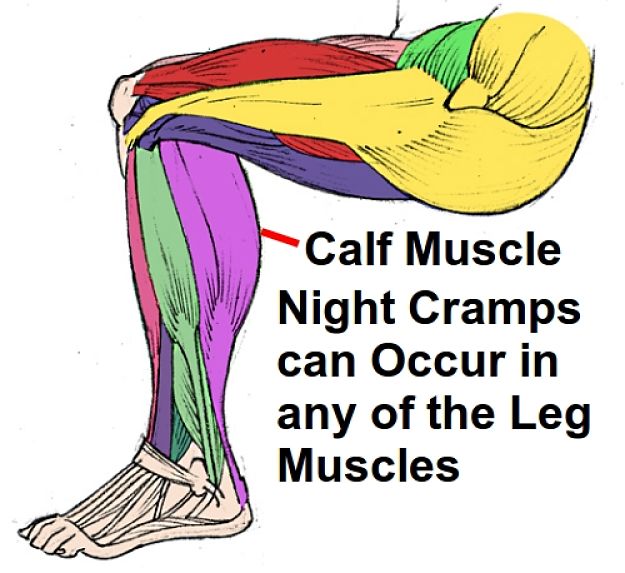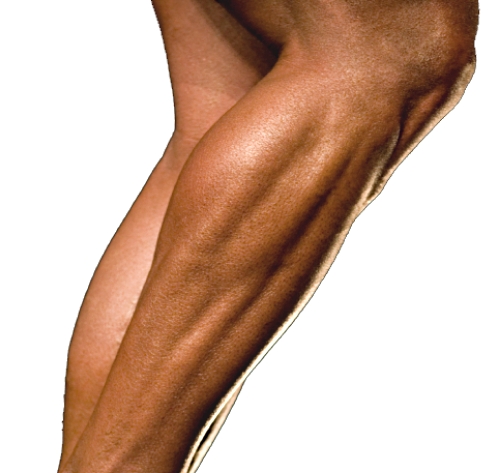Night Leg Cramps Causes, Treatment, Prevention and Cures
Leg cramps that develop at night, often when people are sleeping, is a common problem. About 60% of people are likely to develop cramps at some time during their lives. For some, cramps occur frequently and can disturb sleep patterns. A muscle cramp is a strong, uncontrolled painful contraction of a muscle or a spasm that developed very quickly. It can last for a few seconds and fade quickly or it can build to a huge spasm that may last several minutes and cause a lot of discomfort and pain. Most cramps in the legs occur in the calf muscles. Leg cramps are something most people associate with team sports such as soccer, basket ball and various football codes. These cramps generally occur towards the end of the game when players are stressed and tired from overexertion. In these cases the cramps
are generally associated with ion imbalance in the muscles, particularly Potassium. Dehydration can also trigger muscle cramps. The simple remedy is to stretch the muscles to stop the spasm and to take 'salt; tablets, consume a properly formulated sports drink and consume lost of water. Once a play experiences cramp there is a high risk of recurrence and most players have to leave the field.
Night time leg cramps occurs mostly in the calf muscles and sometimes in the thigh or the foot. They often occur just as you are falling asleep or waking up, but you can also be awaken from a sound sleep by a leg cramp. Often they occur in one leg and not the other, and quite often the same muscle is involved. These cramps cannot be associated with overexertion of muscles, dehydration or ion imbalance that trigger the ones sports men a women, so why do they occur when you are in bed or sleeping?

Night cramps can develop in any of the leg muscles but the calf muscle is the commonest. Original Graphic - janderson99
Causes of Night Time Leg Muscle Cramps?
It remains a mystery, compounded by the fact that there are multiple causes. Sometimes there are various medical problem such as arthritis, liver disease, peripheral vascular disease, circulation problems and diabetes. For this reason doctors use an exclusion principle. they generally work through a list of likely causes specific for the patents using cue such as weight, age, general health and medical history. After underlying medical conditions have been eliminated the next step is to check for signs of the more common general causes.- Taking certain medications, such as birth control pills, statins, diuretics and steroids.
- Dehydration - this can occur without many people knowing it.
- Alcohol consumption which can cause dehydration
- Having insufficient calcium, potassium and other minerals in the blood. This can depend of diet as well a what beverages are consumed. Drinking a good quality sports drink after heavy exertion can help replace the minerals lost in sweat.
- Post-exercise muscle stress. Many people experience nocturnal cramps hours after exercise or even working in the garden, particularly if they do no rehydrate properly and replace the ions lost during heavy sweating.
- Standing on a hard surfaces for hours as a long time or sitting immobilized for long periods of time without taking a break. This may be related to some sort of blood pooling effect of immobility which is known to be a general health hazard.
- Putting your legs in awkward are strained positions while you sleep. Many people find that they develop cramps when they lie a certain way or position their legs in a strained position. Sometimes cramp occurs even when the position is not strained. This may be relation to circulation problems and local pooling of blood within the muscles.
- Exposure to cold temperatures, or getting chilled in the hours before going to bed. Exposure to cold water via a swim or a cold shower can sometimes trigger cramps.
- Being pregnant is often linked with developing cramps via mineral imbalances and hormonal changes. This appears to be related with calcium and magnesium levels in the blood
- Injuries, strains and minor aches and pains in the legs are often precursors to cramping problems.
How to Relax a Cramping Muscle When it Happens
- You can try the methods below which work in most cases
- Stretch and massage the muscle. This is the method the footballers and other sports people use. This stretching often calms the muscle that has gone into a spasm.
- Take a warm bath or shower to get the muscle to relax.
- Apply an ice or cold pack.
- After stretching drink plenty of fluids, including sports drinks such as Gatorade.
- Get up and walk around to stretch the calf muscles
- Sleep in a different position so you won't trigger a recurrence.
- Take quinine or acetaminophen (Tylenol) before bed can help reduce the occurrence of cramps and the pain associated with the cramps.
How can Prevent Leg Muscle Cramps?
- A small dose of muscle relaxant or vitamin B12 might also be help prevent cramps.
- Talk with your doctor if cramps recur regularly despite taking these precautions.
- Avoid overexertion which can leave your muscles very vulnerable to cramps, even hours later. Take a daily, good quality multivitamin and mineral supplement.
- Learn to stretch your calf and other leg muscles regularly throughout the day and before going to bed.
- Get more exercise and avoid being inactive for low periods of time and sitting down without exercise breaks.
- Maintain a healthy diet with plenty of fresh vegetables and fruit that are rich in potassium, calcium and magnesium. Many people claim that eating bananas help and many tennis players and golfers eat bananas during events to try to prevent cramps.
- Drink plenty of water and other fluids to prevent being dehydrated. This especially applies after drinking alcohol or coffee, but of which can cause dehydration. Drink three glasses of water before going to bed. Water is best.

Calf Muscle Cramping: Public Domain Image